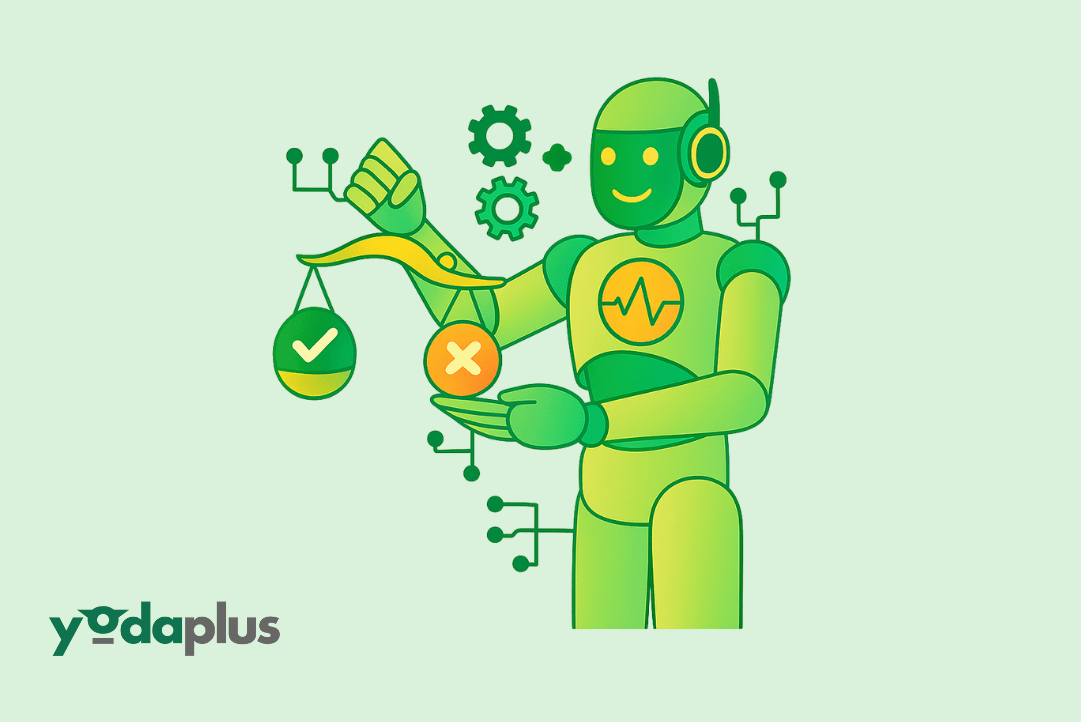
Ethical Dilemmas in Autonomous Decision Loops in Artificial Intelligence
October 8, 2025 By Yodaplus
Artificial Intelligence (AI) has moved from being a tool for automation to becoming an intelligent decision-maker. With agentic AI and autonomous agents now taking on tasks that once required human judgment, the question of ethics has become central. These systems are not just executing pre-programmed instructions; they are learning, adapting, and choosing actions that influence people, businesses, and societies. Understanding how to handle ethical dilemmas in autonomous decision loops is critical to ensuring safe and responsible AI adoption.
What Are Autonomous Decision Loops?
An autonomous decision loop is the process through which an AI agent perceives data, interprets it, makes a decision, and acts—often without human intervention. In agentic frameworks, these loops enable systems to complete goals through reasoning, feedback, and continuous learning. For example, in AI-powered automation, a workflow agent could independently manage logistics operations or optimize a supply chain route.
However, when such systems begin making choices that affect human safety or fairness, they introduce ethical risks. Unlike traditional software, Artificial Intelligence in business operates in complex environments with uncertain data, creating the potential for moral conflict between efficiency and responsibility.
The Core Ethical Dilemmas in AI
AI ethics often revolve around accountability, transparency, and fairness. In autonomous AI, these values become harder to enforce because of self-directed learning and machine learning models that evolve over time. Here are some key dilemmas that developers and organizations face:
1. Responsibility and Accountability
When an AI system makes a wrong decision, who is responsible? The developer, the organization, or the algorithm itself? This question is at the heart of ethical AI. A self-driving vehicle or an autonomous financial advisor can make decisions that have serious consequences, yet tracing accountability remains complex.
2. Bias in Data and Learning Models
AI models are only as fair as their data. If the data mining process includes biased inputs, the resulting AI applications will replicate those biases. Ethical AI requires diversity in data sources and AI-driven analytics to detect and reduce such imbalances.
3. Transparency and Explainability
Many generative AI and deep learning systems function as black boxes. When LLMs (Large Language Models) or neural networks produce outcomes, even developers may not fully understand how decisions were formed. Explainable AI is essential for transparency, especially in critical domains like healthcare, logistics, and finance.
4. Conflict Between Human Values and AI Logic
Intelligent agents often prioritize efficiency, while human values emphasize empathy and fairness. For instance, an autonomous system may allocate medical resources based purely on statistics, ignoring ethical nuances like social need. Ensuring alignment between AI technology and human goals is key to ethical design.
The Role of Agentic AI in resolving Ethical Dilemmas
Agentic AI introduces autonomy, proactivity, and goal alignment into AI systems. Unlike static algorithms, agentic frameworks empower AI to plan, collaborate, and adapt dynamically. However, this flexibility increases the ethical responsibility of designers and organizations.
To maintain control, developers use knowledge-based systems, semantic search, and vector embeddings to ground AI reasoning in verified data. This helps reduce hallucinations, misinformation, and bias in decision-making. Responsible development also involves AI model training practices that ensure fairness and accuracy across diverse datasets.
Crew AI and multi-agent systems provide collaborative checks where agents validate each other’s actions before execution. These structures improve reliability and make autonomous agents safer for enterprise-scale use.
Preventing Ethical Failures in Autonomous AI
Designing reliable Artificial Intelligence solutions means combining technical excellence with ethical foresight. Here are some effective ways to manage AI ethics in autonomous loops:
1. Set Clear Boundaries:
Define rules within AI workflows to restrict decisions that could harm users or breach compliance.
2. Build Human Oversight:
Ensure that every autonomous agent reports its reasoning and decisions for human validation.
3. Implement Feedback Systems:
Continuous learning must include feedback from users and auditors to refine AI frameworks responsibly.
4. Use Data Verification Tools:
Regular data audits through AI-driven analytics and machine learning models ensure decisions are based on accurate and updated information.
5. Promote Responsible AI Practices:
Integrating ethical checkpoints within development pipelines builds reliable AI systems that align with business goals and human values.
Balancing Autonomy and Accountability
The goal of ethical AI design is not to eliminate autonomy but to make it safe. By using AI-powered automation backed by human oversight and responsible AI practices, organizations can ensure both innovation and integrity. As Artificial Intelligence and agentic AI continue evolving, their ability to self-correct, explain outcomes, and respect human ethics will define the future of automation.
At Yodaplus, our approach to artificial intelligence services emphasizes transparency, traceability, and accountability. By combining autonomous AI with structured governance, we help enterprises deploy systems that are both high-performing and ethically aligned.
Final Thoughts
The rise of autonomous systems has redefined what decision-making means in technology. The challenge now lies in ensuring these systems act responsibly while retaining the agility and intelligence that make them transformative. Ethical AI innovation is not just about what Artificial Intelligence can do — it’s about ensuring it does what it should.
In an era where AI agents and agentic AI are shaping the future of work, building ethical, explainable, and trustworthy systems will be the foundation for sustainable progress.